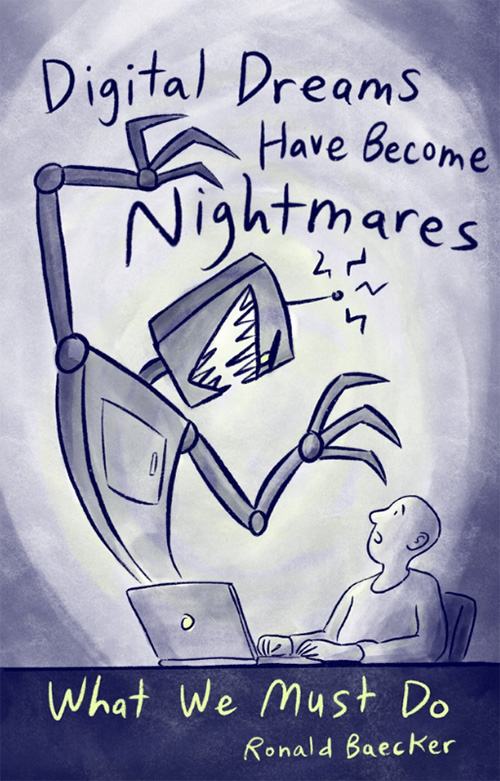While the benefits and conveniences of the digital world are endless, Ronald Baecker also believes there’s an alarming dark side to our obsession with technology.
And it can be downright scary, with powerful consequences we’re only just beginning to understand. In fact, it’s so scary he believes we need to act now to curtail them.
But what exactly are the threats and what can we do about them?
Baecker, a professor emeritus with the Faculty of Arts & Science’s Department of Computer Science, offers insights and suggestions in his new book titled, Digital Dreams Have Become Nightmares: What We Must Do.
“I debated wordings for the title, but I decided to be more insistent — it's what we must do,” says Baecker. “So, I've tried to come up with a concise list of actions in the context of knowing this huge set of nightmares.”
Describing the book as, “in this middle ground between trade book and textbook,” it documents the course of computer technology over the past 60 years. Divided into three parts, it begins with the exuberance and optimism about computer technology’s potential to revolutionize how we live.
Baecker himself remembers that excitement, having worked on some of the very first innovative computers in the 1960s.
In the book’s opening, Baecker confesses, “It was not computer programming that hooked me. It was believing that computers could change the world. I assumed this would be for the better. Over the next 50 years, at MIT and at the University of Toronto, my students and I worked to make this vision a reality.”
And in so many ways they have, with Baecker highlighting how computers have dramatically improved areas such as health care and commerce, and how it’s opened infinite possibilities in free speech, as well as creativity and collaboration through the creation of communities.
He also includes short profiles of what he calls “digital pioneers” — leaders and visionaries of the digital revolution such as Sir Tim Berners-Lee, the English computer scientist best known as the inventor of the World Wide Web, and American computer scientist Alan Kay — considered by some as the “father of personal computers” — whose programming work paved the way for creating laptops and tablets.
Part II of the book examines how the technologies we’ve come to rely on have also led to serious trouble — a digital world that has created greater inequities and division, and “new forms of nastiness that range from the mildly annoying to the life-threatening.”
“I talk about everything from hate speech to fake news to disinformation about COVID,” says Baecker. “I talk about threats to privacy, including government, large corporations, increasing levels of automation that has led to disruptions of current employment patterns such as the gig economy.”
He also devotes a chapter to what he calls, “risky artificial intelligence, AI algorithms that are being trusted yet are making serious mistakes, and software that we don't understand.”
Of all the threats, what keeps Baecker up at night?
“The two nightmares that frighten me most are our big tech monopolies, particularly Amazon and Facebook, and a premature reliance on AI before it's reliable and safe,” says Baecker.
He points to examples such as the recent report that Facebook shields millions of VIP users from their automated content moderation system.
“AI is being used or proposed for use prematurely and with huge risks to society in domains such as health, criminal justice, senior care, and warfare,” says Baecker. “Much of current AI is unreliable and deceptive in hiding that it's an algorithm, and is unable to explain decisions.”
Despite this looming digital dark cloud, and the sense of urgency, positive change is possible, believes Baecker.
In Part III, he provides suggestions to keep things from getting worse, to mitigate the damages and move towards a safer and more humane world. His recommendations are for computer scientists, scholars, technology professionals, governments and the general public.
“The first one is so simple and so trivial that it's obvious, which is to avoid tech addiction and intimidation,” says Baecker. “It’s really important for us, no matter who we are, no matter what our job is, to say no to technology at times.”
Other recommendations include making the study of computer science more ethical, taming big tech giants, and avoiding unproven artificial intelligence. Another suggestion is for citizens to speak out about technology when it poses a threat.
“A good example of this happened here with Google's attempt to make Toronto a Smart City, which had all sorts of scary privacy implications,” he says. “People in Toronto spoke up so vigorously that Google first scaled down the project and then abandoned it. So, we can make a difference. We just need the courage to speak up.”
In the hope of getting others to speak up, Baecker has also helped create a non-profit group Computers and Society — a virtual community and resource site for learning and thinking ethically in the online world.
“This is a place where we can continue the conversation and continue to engage,” says Baecker. “We reference about 80 important books, over 1,000 papers and related events. It's very exciting to see how this has come together.”
In addition to being excited, Baecker is also optimistic.
“The book’s overall message is one of hope, and I am hopeful,” says Baecker. “All I'm trying to do is bring some of the ideas and synthesize them in one place in a way that is accessible to not only a technical audience, but a lay audience.”


